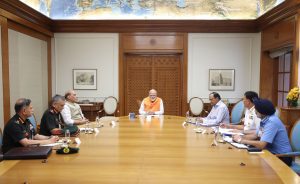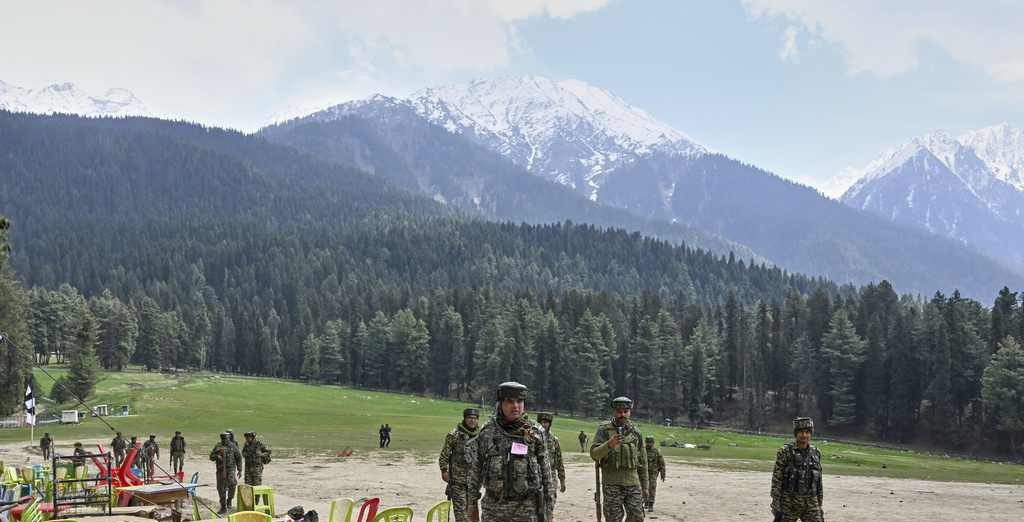With India and Pakistan are on the brink of another war following Pahalgam attack, Bangladesh has broken its silence.
Chief Adviser Muhammad Yunus acknowledged that while he opposes war, Bangladesh cannot ignore the evolving security realities in the region.
“It is difficult for Bangladesh to remain unprepared, and adopting a stance of inaction would be a suicidal approach in light of the escalating tensions between India and Pakistan,” Yunus said on Wednesday.
“Like many others, I oppose war in all forms. But we live in a world where the threat of war constantly looms,” he added, while addressing members of the Bangladesh Air Force (BAF) during a strategic guidance speech.

Yunus cited growing media reports pointing to a war-like situation and referred to the rapidly deteriorating relations between the two nuclear-armed neighbours.
He underscored that although war is always “very expensive”, the current geopolitical reality demands intensified national preparedness.
Prior to addressing the BAF officers, the CA joined a ceremony also attended by Chief of Army Staff General Waker-Uz-Zaman.
Sources concerned said that the CA had discussions with the Army Chief about current volatile situation in the sub-continent following the April 22 attack in Pahalgam.
Tensions sharply escalated between India and Pakistan after 26 people were killed in the attack in the resort town of Pahalgam in Indian-administered Jammu and Kashmir.
India has accused Pakistan of sponsoring the assault—an allegation Islamabad strongly denies.
India’s Cabinet Committee on Security (CCS) on Wednesday held its second high-level meeting since the attack with Prime Minister Narendra Modi in the chair. Intelligence briefings in the meeting reportedly confirmed cross-border links to the attackers, suggesting the motive was to destabilise the region, disrupt the electoral process, and harm the tourism industry.
Following the CCS session, the Cabinet Committee on Political Affairs (CCPA) was convened to address rising domestic political pressure. Opposition leaders, including Mallikarjun Kharge and Rahul Gandhi, called for a special session of Parliament to forge a united front on national security.

Modi later met with key ministers behind closed doors and reportedly stated that India was committed to delivering a “crushing blow” to terrorism. He also expressed full confidence in the armed forces.
Air tensions spike: PAF scrambles jets against Indian Rafales
Late Tuesday night, Indian Rafale fighter jets were detected patrolling the skies over Indian-administered Kashmir. Pakistan Air Force (PAF) jets were scrambled in response, Pakistani state media reported.
According to Radio Pakistan, four Indian Rafales flew close to the Line of Control (LoC) but did not cross into Pakistani airspace. PAF said its jets intercepted the Indian patrols, prompting them to retreat.
India has not issued any official statement regarding the incident, but Islamabad accused New Delhi of deliberately stoking tensions through “provocative military manoeuvres”.
Amidst the aerial posturing, India this week signed a significant $7.7 billion deal with France to procure 26 Rafale Marine jets for its navy. The jets will enhance India’s air-naval capabilities and allow interoperability with the Indian Air Force’s existing Rafale fleet.
Pakistan warns of imminent Indian strike
Adding to the volatile mix, Pakistan claimed on Wednesday that it had received “credible intelligence” indicating India was planning a military strike within the next 24 to 36 hours, under the pretext of “baseless and concocted allegations” regarding the Pahalgam attack.
The two countries have since exchanged gunfire along the LoC. While India accused Pakistan of initiating unprovoked firing in the Naushera, Sunderbani, and Akhnoor sectors, Pakistan’s state media claimed Indian troops used heavy weaponry overnight in the Mandal sector of Pakistan-controlled Kashmir.
Independent verification of these incidents has not been possible. Historically, both sides have frequently accused each other of violating ceasefire agreements along the disputed Himalayan frontier.
International community urges de-escalation
The international community has expressed deep concern. UN Secretary-General António Guterres held separate phone calls with both nations, urging restraint and warning against a confrontation with “tragic consequences”.
The US State Department also called for de-escalation, announcing that Secretary of State Marco Rubio would engage directly with the Indian and Pakistani foreign ministers to encourage dialogue and avoid further military escalation.
The attack in Pahalgam was claimed by a previously unknown group calling itself the Kashmir Resistance. Survivors said the gunmen singled out Hindu men and shot them at close range.


